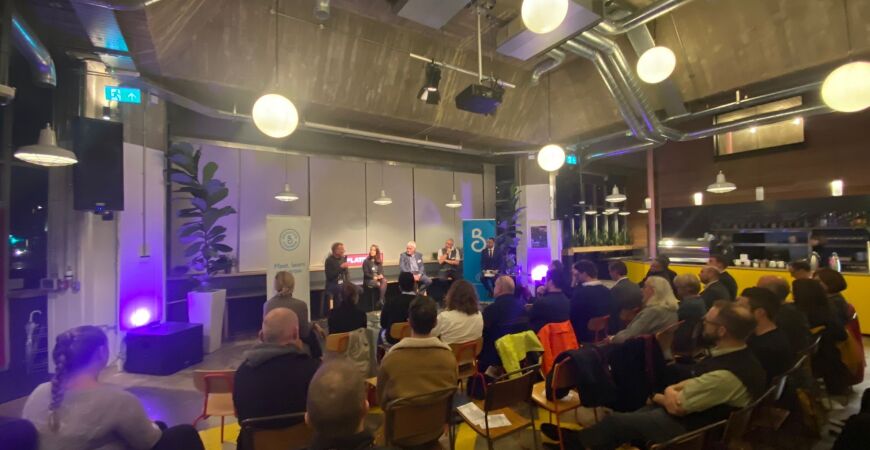

Wed 24 / 11 / 21
Construction Voice explores “Harnessing carbon reduction in the property and construction sector”
Paula Seager of Natural PR writes after Brighton Chamber's latest Construction Voice event, discussing how to harness carbon reduction in the property and construction sector.
By Paula Seager of Natural PR Ltd
Chaired by Ed Allison-Wright of Haydon Consulting, the panel discussion quickly revealed that there is no easy or quick fix, yet the world, and Brighton & Hove, are racing against time if we are to reach net zero by 2030. If anyone came along to this session expecting easy answers to harnessing carbon reduction in the property and construction sector, I’m afraid they were disappointed.
Daniel Jenkins, Director of ECD Architects, kicked off the topic highlighting the view that keeping carbon in buildings is best, focusing on retrofit and for new build using ‘passive house’ building standards, which he said can use as much as fourteen times less energy than typical pre-1900 buildings. He said that now that Councils have signed up to net zero targets to tackle the climate emergency, they are leading the thinking in terms of trying to ensure developers are delivering environmental standards. He also pointed out that we’ll be living in about 80 per cent of the same properties in thirty years and so we should be addressing them because they use a huge amount of energy compared to new build.
Valentine Quinio, Analyst, Centre for Cities, came to the topic from a broader perspective following her research on the key role cities will play in achieving net zero, despite only 10 per cent of land being cities. She pointed out that we are all looking at domestic emissions, electric cars, etc, but that we must also look at the urban form because density means shorter journeys and more energy efficient homes (flats and terraces) and the carbon emission per head tends to be lower in cities. She said that in Britain commercial and office space as well as housing has predominantly been built outside of cities, supported by incentives to do so, but this is having a huge impact on our carbon footprint. Even UK cities are not very dense compared to European cities such as Paris and Barcelona, and we can use those as good models.
Miles Davidson, Housing Sustainability Manager from Brighton & Hove City Council, focused on issues related to the Council’s own housing stock and how important communications and taking our residents with us will be in the transition to carbon neutral by 2030. There is particular concern around inadvertently introducing higher energy bills or other problems, such as condensation, as happened in the past. He said we need confidence in the supply chain to be able to introduce the right eco-technology, balanced with compliance in such things as electrics, gas, fire safety, etc at most cost-effective price possible.
Steve Creed, Co-founder of Circular Economy Brighton & Hove, said we need to step back a bit and consider all the elements, suggesting we use a circular approach because it’s all about a system. He said everything is connected to everything else in this challenge, pointing out that more waste equals more carbon, whether it is the beginning or end of a building’s life.
He said we need to follow a route map that helps BHCC deliver a more circular economy in the city; that we need behaviour change and to achieve this we need a plan with the background information that allows people to feel comfortable trying new things without fear of unknown cost and impacts. People will resist innovation unless they understand the implications and said that we need a major culture change, particularly the one where people want to own their own house, because this makes a huge carbon impact. Could we change this perhaps make generational renting possible? At present, if you give people buying a new home an alternative between a double fridge or a solar panel roof, they will choose the fridge. It’s about communication.
Ed asked the audience the question: Do we need national policy level or does local have what it needs to effectively address the problem?
A mix of architects, builders, planning advisors and local authority housing and planning officers raised points covering the criteria used by public sector when looking at value; good planning when updating housing stock; whether local authorities have the powers needed to make the necessary changes; banking and how some offer discounted fees for more eco-friendly housing; and how costs can only come down when demand grows.
Victoria Vasiliauskaite from Roadways said that 40 per cent of building is underground and we keep using concrete, when a single drum has very high carbon cost; and that the UK is lagging behind other countries on this. Robert Bowden from Bowden Property Consulting continued on the theme of concrete and decried it as one of the single most destructive things in the world, saying it is time to move away from concrete and that a change of mindset is needed as to how buildings are built.
Ed summed up that planning authorities need to instruct developers to use alternatives and create incentives to do so. Overall, there seemed a consensus that we do not yet have the right balance of policies and incentives to make net zero possible by 2030. We have a culture whereby everyone wants the most cost-effective solution, not the most carbon efficient.
Ultimately, as Luke Bray of Axiom Architects said, ‘Everything is driven by the bottom line and developers’ driver is finance. Until it is enshrined in national and local policy, developers will always do the minimum they can to get planning.’
If you're interested in finding out more about Construction Voice, and previous events, head over to the Chamber's Construction Voice page here.
With thanks to our event sponsor, ECD Architects, and to our education partner, University of Brighton.

Paula Seager is MD of Natural PR, specialists in public consultation and PR for developers and the construction industry. Find out more about Natural PR on their website.
To stay up to date with the latest events from Brighton Chamber, sign up to our mailing list, and browse more events on our website:
If you want to contribute to the Chamber blog, contact us on hannah@brightonchamber.co.uk



